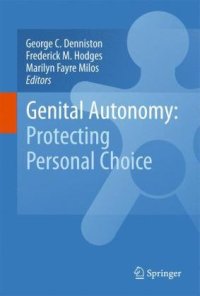
Ebook: Genital Autonomy:: Protecting Personal Choice
Author: J. Steven Svoboda (auth.) George C. Denniston Frederick M. Hodges Marilyn Fayre Milos (eds.)
- Tags: Biomedicine general, Medicine/Public Health general, Theory of Medicine/Bioethics, Media Law, Personality and Social Psychology, Public Health
- Year: 2010
- Publisher: Springer Netherlands
- Edition: 1
- Language: English
- pdf
Circumcision affects 15.3 million children and young adults annually. In terms of gender, 13.3 million boys and 2 million girls are subjected to the involuntary removal of part or all of their external sexual organs every year. The problem of female circumcision has been addressed on an international level, but male circumcision remains a controversial subject that many academics have been reluctant to examine. Circumcision is tolerated today because it has been practiced for millennia by a small but vocal minority of religious and ethnic groups, however, when the practice is examined through the lens of modern legal, ethical, and human rights advancements, no place remains in civilized society for this body-altering ritual. In Genital Autonomy: Protecting Personal Choice, international experts address various types of genital modifications, the impact of these harmful traditional practices on the child, on human rights, and on the development of the concept of bodily integrity. The papers presented in this volume address these topics from a variety of angles. They question and dissects the true motivations of the doctors, witch doctors, and “holy men” who promote and profit from circumcision.
Circumcision affects 15.3 million children and young adults annually. In terms of gender, 13.3 million boys and 2 million girls are subjected to the involuntary removal of part or all of their external sexual organs every year. The problem of female circumcision has been addressed on an international level, but male circumcision remains a controversial subject that many academics have been reluctant to examine. Circumcision is tolerated today because it has been practiced for millennia by a small but vocal minority of religious and ethnic groups, however, when the practice is examined through the lens of modern legal, ethical, and human rights advancements, no place remains in civilized society for this body-altering ritual. In Genital Autonomy: Protecting Personal Choice, international experts address various types of genital modifications, the impact of these harmful traditional practices on the child, on human rights, and on the development of the concept of bodily integrity. The papers presented in this volume address these topics from a variety of angles. They question and dissects the true motivations of the doctors, witch doctors, and “holy men” who promote and profit from circumcision.